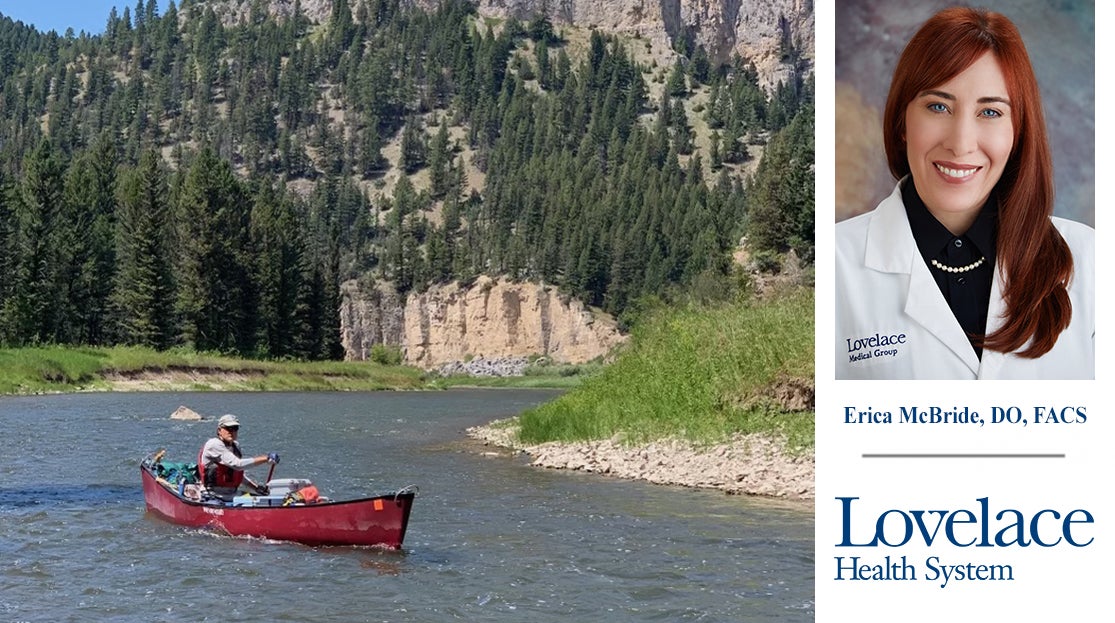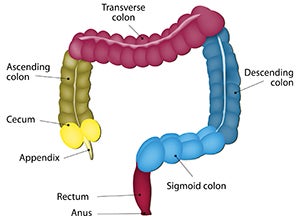
When Daniel Shaw, a 62-year-old science teacher at Albuquerque’s Bosque School, leads his students into the desert to collect data on North American porcupines, he often talks about the power of information: what did you observe; what did you find; what conclusions can you draw from the data?
When Daniel and his doctors discussed his long-time gastrointestinal problems, they used the same kind of questions: what are his symptoms; what treatments have worked; and what can be done in the future to alleviate his pain and side effects?
Chronic abdominal pain
“I have dealt with chronic, low-grade abdominal pain for more than 30 years,” said Daniel. “Much of my teaching work involves walking outdoors with my students. I pretty much ignore the pain, but if I think about it, it’s there. I would say on a scale of 1-10, it is a 2. To me, the pain is just background noise that one has to figure out a way to deal with it without being grumpy to other people.”
For many reasons, Daniel shied away from any kind of exploratory surgery to find out what was going on. He would meet regularly with his gastroenterologist who kept trying to figure out non-surgical methods of treatment for his abdominal pain.
“My medical history is such that I often have adverse reactions to things that no one else does,” he said. “For instance, I had a tooth extracted for some implants and the oral surgeon said my case was 1 of the 3 most difficult cases in his 20-year career.”
Sometimes Daniel’s pain would get so bad that his doctor would meet him at the emergency room or on an emergency basis. By the fall of 2019, his case became extremely acute. It was at this time that his gastroenterologist referred Daniel to Lovelace Medical Group general surgeon Erica McBride, D.O., F.A.C.S.
Meeting with Dr. McBride
“My gastroenterologist knew that I had a nuanced response to medical procedures and that I would be very hesitant to talk to a surgeon. Still, she tracked down Dr. McBride, who invited me for a visit and a conversation. During the days leading up to the appointment, and during the drive there, I practiced what I was going to say and how I was going to tell her that I was not going to have surgery,” Daniel said.
It was Dr. McBride’s demeanor and personality that really made an impact on Daniel.
 “From the start of our conversation, Dr. McBride was very attentive,” said Daniel. “I really felt that she was listening to me. She asked probing questions, making sure that she completely understood my circumstances. Based on what she heard, she laid out her plan for surgery. At the end of our conversation, she said, ‘I don’t need an answer now, just think on it and let me know.’”
“From the start of our conversation, Dr. McBride was very attentive,” said Daniel. “I really felt that she was listening to me. She asked probing questions, making sure that she completely understood my circumstances. Based on what she heard, she laid out her plan for surgery. At the end of our conversation, she said, ‘I don’t need an answer now, just think on it and let me know.’”
Daniel said by the time he had walked out to his car, he had decided that Dr. McBride’s plan was the best next step he could take. The surgery was scheduled soon thereafter.
During surgery, the doctors discovered that he had a redundant colon, meaning he had far more colon than he needed. This condition often happens in the Sigmoid area of the colon. In Daniel’s case, the extra amount of colon ended up twisting into knots on itself, which caused lots of pain and problems for his digestive tract.
But after recovering from the surgery to remove the twisted parts of his colon, Daniel found that he still had problems. “My stomach and colon decided they would do their own thing and started shutting down again and closing off,” explained Daniel. So Daniel went into surgery again to fix that area of his colon.
Adverse reactions
Months went by and Daniel’s gastrointestinal symptoms started to appear again, which came as a surprise to both his gastroenterologist and Dr. McBride.
“I saw my gastroenterologist and told her about the problems I was having. She said, ‘Those are not normal symptoms for someone who had your type of surgery.’ So she tried a variety of procedures and interventions that had proved helpful for most everybody else, but not for me.”
Meanwhile, Daniel’s gastroenterologist started communicating regularly with Dr. McBride about his condition, sometimes texting each other with ideas and drawings. They explored medical journals on their own, which led each of them to come up with a possible explanation.
“The doctors explained that I may likely be allergic to the metal used in surgical staples,” recounted Daniel. “They had each found a case where the patient had the same symptoms as me. All of a sudden, my abnormal health issues appeared to be explained – the problems with dental implants that involved metal posts, the reaction to the second surgery, the fact that it’s hard for me to wear any jewelry, even my wedding band. It all makes sense now!”
Daniel underwent a third surgery to remove the portion of his colon that used metal surgery staples to connect the tissue. “I apologized to Dr. McBride for having to repeat the surgery, this time with sutures (sterile surgical thread). She replied, ‘That’s okay, I like to sew.’”
Later, Daniel would undergo a final surgery to repair a small section of his colon that had become inflamed.
High praise for Dr. McBride
Through all four surgeries, Daniel had nothing but high praise for Dr. McBride and her staff.
“Each time I have worked with her, she has been incredibly attentive. Her entire team is amazing. From her scheduler to her physician assistants, her health techs, the OR team – everybody I interacted with made it clear that Dr. McBride was the team leader, but each of them had their own unique jobs to do. I felt so well cared for throughout my entire Lovelace experience,” Daniel said.
Daniel also took a moment to reflect on the chronic pain that he felt for decades.
“The truth is, I am better than I was, in terms of my gut, then when I started several years ago. Now the chronic pain is gone and everything else has been repaired,” he said.
Daniel is back to his normal activities like hiking in the desert with his students, running for a couple of hours with his dogs or canoeing with family and friends on one of the many rivers in the Western U.S. But one story from his recovery really made an impact on him.
“During my recovery period,” recalled Daniel, “I tried to go out for a little run, but I felt something strange down there, so I didn’t run. I didn’t want to mess anything up. But when I told Dr. McBride, she said, ‘Daniel, you’re a scientist. One data point does not make a trend. So get back out there and jot down some notes about what you feel. You need to be active, whether it is running, canoeing or whatever. That’s who you are and we need to get you back to doing that.’”
Sounds like a great lesson for Daniel, his students, and us all.
If you would like to learn more about the surgery services at Lovelace Health System, visit our website.




